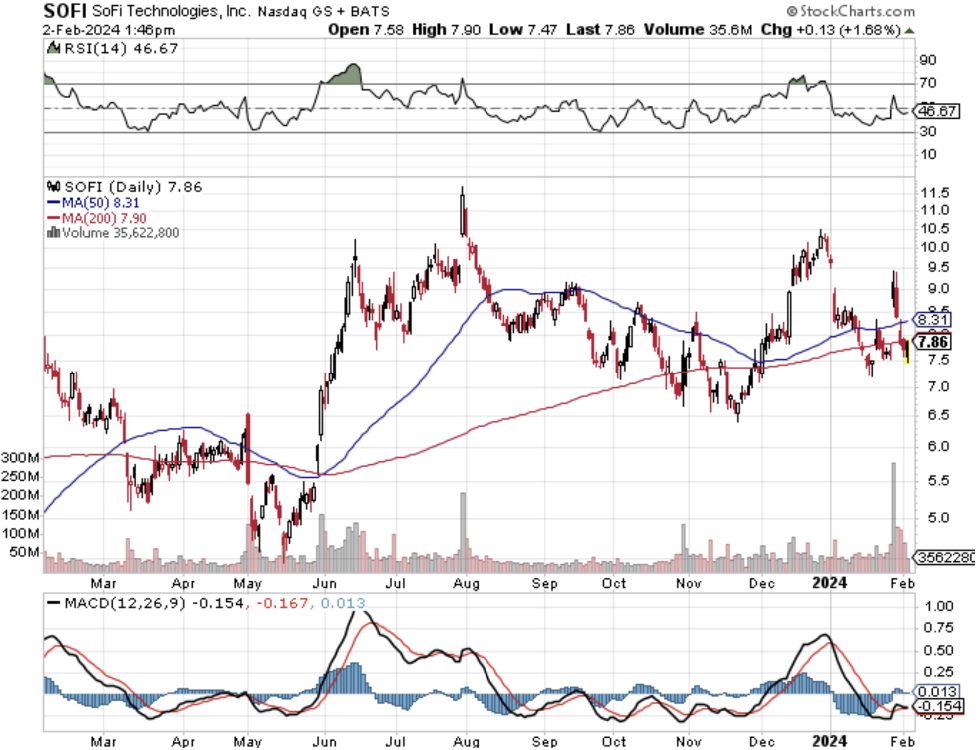Mad Hedge Technology Alerts!
Mad Hedge Technology Letter
February 2, 2024
Fiat Lux
Featured Trade:
(THE TECH LENDER)
(SOFI)

SoFi Technologies stock exploded higher earlier this week after the financial technology company posted its first quarterly profit.
That’s a mighty feat for a small tech firm - they usually burn through cash fast and cry for help from lenders.
The stock was up over 20% and that moment is another reminder about the absolute ferocity of the January move in short-term tech.
Few big tech stocks have posted positive earnings, and sure, there have been modest selloffs only for the broader tech market to rocket higher.
Each pullback has been met by a rip-your-face-off bullish reversal move.
Try to short tech at your peril.
What does that mean for Sofi?
SOFI retraced its bullishness by 10% and is trading back in the $8 range.
Heightened volatility is a hallmark of small tech stocks like Sofi and the firm won’t be able to shake this label until they grow larger and display stable earnings.
They posted fourth-quarter earnings of 2 cents a share, and in the year-ago quarter, it posted a loss of 5 cents a share.
Adjusted net revenue of $594.25 million in the fourth quarter beat the $572 million analysts had forecast. A year ago, revenue was $443.42 million.
SoFi began as a lender focused on refinancing debt but now operates through three segments: lending, which includes student, personal, and home loans; financial services; and a technology platform.
Record revenue at the company level was driven by record revenue across all three of the business segments, with a record contribution of 40% of adjusted net revenue generated by non-Lending segments (Technology Platform and Financial Services segments).
Deposits increased by $2.9 billion to $18.6 billion in the quarter, and customers grew by nearly 585,000 to more than 7.5 million.
Because personal loans take up the biggest share of the portfolio, analysts tend to pay attention to those numbers. At the end of 2023, the company said, personal loans were marked at 104.9%—up from 104% at the end of the third quarter.
Beyond 2024, the company forecasts 20% to 25% compound revenue growth from 2023 to 2026, with per-share earnings from 55 cents to 80 cents a share in 2026.
Sofi continues to be the high-risk, high-reward name that intrigues investors on big drops.
Every spike in shares has also offered a short window of opportunity to short the stock.
Conversely, each drop of 10% or 20% has been a great entry point into shares.
As we advance further into 2024, the narrative will soon change into the Fed pivot and even though the Fed has said they won’t cut rates yet, the market is anticipating it later this year.
For any tech stock that is interest rate sensitive like Sofi, I don’t see how it is smart to bet against them for the rest of 2024.
Tech often overshoots to each side and Sofi shares will be higher in one year from now after the Fed finally does follow through with 1.5% of interest rate cuts which equals to 6 quarter point cuts.
Sofi’s projected 25% revenue growth certainly will add more firepower to share price action if they can pull it off.
However, these types of early-stage companies are notorious for overpromising and underdelivering.
Mad Hedge Technology Letter
January 31, 2024
Fiat Lux
Featured Trade:
(FOLLOW THE CELL TOWERS IN TECH)
(CCI)


